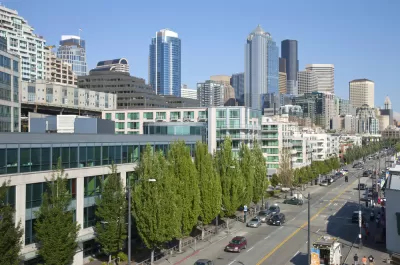Seattle is one of the U.S. cities shrinking minimum parking requirements to allow for denser, more affordable development near transit.

An oversupply of parking in U.S. cities has grave unintended consequences, directly leading to "higher housing costs, inefficient land uses, and more vehicle ownership and driving. As such, oversupplying parking harms the environment, reduces housing affordability, and thwarts efforts to improve social equity," C.J. Gabbe, Gregory Pierce, and Gordon Clowers say.
The writers explain a case study in Seattle, where after parking minimums were reduced in 2012, the city was seemingly able to increase housing development projects and encourage modes of transportation other than the automobile. The minimum requirement reduction, in line with the city's comprehensive plan, eliminated on-street parking for multifamily housing in dense urban areas, and dramatically decreased minimums for areas in close proximity to transit options.
Gabbe, Pierce, and Clowers conducted research to determine if developers built less parking in the areas with reduced requirements. Studying 60,361 housing units between 2012 and 2017, the researchers found that developers did, in fact, build less parking when requirements were reduced.
"About two-thirds of the projects we examined — mainly those in the downtown and its densest surrounding urban centers — were not required to provide any off-street parking. Most buildings in our sample provided less than one parking space per unit, and a sizable share, nearly 20%, provided no parking at all," the team writes. "Our results show that (1) minimum parking requirements often constrain developers, and (2) reducing those requirements leads to less parking, which presumably means cost savings for developers and lower housing prices for consumers."
When developers are forced to comply with excessive parking requirements, the researchers point out, they lose out on space and funds that could be used to build commercial or residential units. According to Gabbe, Pierce, and Clowers, less parking could mean more housing, and in turn, less incentive for automobile reliance.
FULL STORY: How Developers Respond to Parking Reform

Florida Considers Legalizing ADUs
Current state law allows — but doesn’t require — cities to permit accessory dwelling units in single-family residential neighborhoods.

Manufactured Crisis: Losing the Nation’s Largest Source of Unsubsidized Affordable Housing
Manufactured housing communities have long been an affordable housing option for millions of people living in the U.S., but that affordability is disappearing rapidly. How did we get here?

Research Shows More Roads = More Driving
A national study shows, once again, that increasing road supply induces additional vehicle travel, particularly over the long run.

EV Chargers Now Outnumber Gas Pumps by Nearly 50% in California
Fast chargers still lag behind amidst rapid growth.

Affordable Housing Renovations Halt Mid-Air Amidst DOGE Clawbacks
HUD may rescind over a billion dollars earmarked for green building upgrades.

Has Anyone at USDOT Read Donald Shoup?
USDOT employees, who are required to go back to the office, will receive free parking at the agency’s D.C. offices — flying in the face of a growing research body that calls for pricing parking at its real value.
Urban Design for Planners 1: Software Tools
This six-course series explores essential urban design concepts using open source software and equips planners with the tools they need to participate fully in the urban design process.
Planning for Universal Design
Learn the tools for implementing Universal Design in planning regulations.
City of Moreno Valley
Institute for Housing and Urban Development Studies (IHS)
City of Grandview
Harvard GSD Executive Education
NYU Wagner Graduate School of Public Service
City of Cambridge, Maryland
Newport County Development Council: Connect Greater Newport





























